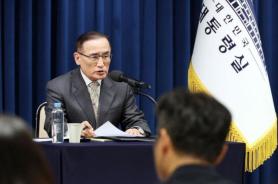
Lee, who is currently in Abu Dhabi before attending the Group of 20 (G20) summit in South Africa later this week, explained that choosing the UAE as the first stop on his Middle East tour reflects his "strong will to solidify and advance bilateral relations."
South Korea has "the capacity to meet the UAE's requirements for developing its semiconductor ecosystem and strengthening its competitiveness in advanced industries," he said. "As a leading global producer of memory chips in the semiconductor supply chain, [South] Korea is a strategic partner capable of providing the advanced AI-memory chips the UAE needs."
Affirming that South Korea's relations with the UAE have evolved from traditional economic cooperation into a "comprehensive and special partnership," he stressed this is "not only a turning point for expanding trade and investment, but also a launchpad towards becoming the UAE's closest economic partner.'"
Lee also highlighted the success of the UAE's first nuclear power plant in Barakah, which is now fully operational after 12 years of construction by South Korea's state-run Korea Electric Power Corporation (KEPCO), opening a "new chapter in energy cooperation."
Referring to the Comprehensive Economic Partnership Agreement (CEPA) signed last year, he said, "Tariffs will be eliminated on more than 90 percent of goods exchanged between the two countries including [South] Korean-made electric and hybrid vehicles and UAE petrochemical products. This will help expand bilateral trade, enhance industrial competitiveness, and generate benefits for consumers in both nations."
After wrapping up his itinerary in the UAE, he will travel to Egypt before heading to Johannesburg for the first G20 summit to be held on the African continent slated for this weekend. After a brief stop in Turkey, Lee is scheduled to return home on Nov. 26.
* This article, published by Economic Daily, was translated by AI and edited by AJP.
Copyright ⓒ Aju Press All rights reserved.


